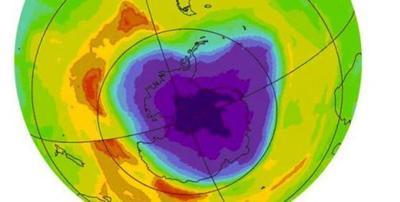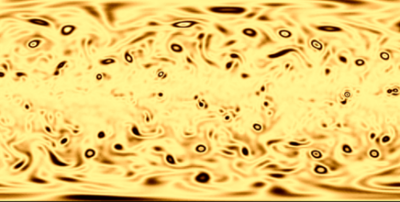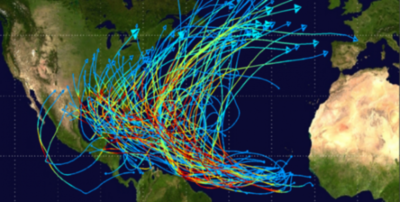Atmosphere & Climate
Atmospheric processes are central to many of the forcings and feedbacks that determine the magnitude of climate change. The atmosphere is also central to many of the possible impacts of climate change, such as changes in the intensities of tropical and extratropical storms and changes in the character of precipitation.
 PAOC researchers are investigating how the chemical evolution of the atmosphere and ongoing emissions of greenhouse gases affect the climate system. Atmospheric feedbacks include changes in water vapor concentrations and cloud distributions, and so a proper understanding of atmospheric processes is needed to determine how the climate system responds to a given radiative forcing. Changes in aerosols and ozone also affect the climate system, and again there is the possibility of a complex interplay between radiative forcing, cloud and convective processes, and the circulation. Changes in the temperature and energetics of the climate system are expected to affect weather patterns. PAOC researchers have found that the transient eddies in the extratropical atmosphere (the familiar high and low pressure systems in the midlatitudes) increase or decrease in strength in response to a general warming depending on the hemisphere and season. In fact, there may be an ''optimally stormy'' climate state for the midlatitudes, and it is of interest to discover if such a state has occurred over Earth's history. The question of whether tropical storms intensify in a warming climate is made difficult by our inability to properly resolve such storms in global climate model simulations. PAOC researchers address this problem using theoretical bounds on intensity, analysis of the historical record, use of paleo-proxies for land-falling storms, and a range of regional models of the tropical atmosphere.
PAOC researchers are investigating how the chemical evolution of the atmosphere and ongoing emissions of greenhouse gases affect the climate system. Atmospheric feedbacks include changes in water vapor concentrations and cloud distributions, and so a proper understanding of atmospheric processes is needed to determine how the climate system responds to a given radiative forcing. Changes in aerosols and ozone also affect the climate system, and again there is the possibility of a complex interplay between radiative forcing, cloud and convective processes, and the circulation. Changes in the temperature and energetics of the climate system are expected to affect weather patterns. PAOC researchers have found that the transient eddies in the extratropical atmosphere (the familiar high and low pressure systems in the midlatitudes) increase or decrease in strength in response to a general warming depending on the hemisphere and season. In fact, there may be an ''optimally stormy'' climate state for the midlatitudes, and it is of interest to discover if such a state has occurred over Earth's history. The question of whether tropical storms intensify in a warming climate is made difficult by our inability to properly resolve such storms in global climate model simulations. PAOC researchers address this problem using theoretical bounds on intensity, analysis of the historical record, use of paleo-proxies for land-falling storms, and a range of regional models of the tropical atmosphere.
Groups
John Marshall's group studies the general circulation of the ocean and its role in the global climate.
Professor Ron Prinn's group works on incorporating the chemistry, dynamics, and physics of the atmospheres of the Earth and other planets, and the chemical evolution of atmospheres. We are also the pioneers of estimating global emissions of non-CO2 g...
Our group research focuses on using atmospheric chemistry and integrated modeling to inform decision-making strategies on air pollution and climate change. We are currently doing work in three main areas: Impacts of Air Pollution and Climate Change, ...
Chien Wang's group works on various issues related to atmospheric aerosols, clouds, and tropospheric chemistry, and studies the climate impacts of aerosols and anthropogenic pollutants.
McGee's Group uses uranium and thorium isotopes to reconstruct and understand past climates, with a particular focus on reconstructing changes in atmospheric circulation and the balance of precipitation and evaporation. Current projects focus on the ...
Susan Solomon's research group is interested in atmospheric chemistry and its effect on the Earth's climate system.
Professor Paul O'Gorman's group works on problems associated with the large-scale dynamics of the atmosphere and the hydrological cycle. Areas of particular interest include the behavior of precipitation, moist convection and extratropical storms in ...
Professor Kerry Emanuel's group works on problems related to tropical circulation and climate.
Centers & Initiatives
The Center for Global Change Science (CGCS) seeks to better understand the natural mechanisms in ocean, atmosphere and land systems that together control the Earth's climate, and to apply improved knowledge to problems of predicting climate changes. ...
Named after the late MIT meteorologist Edward N. Lorenz, a pioneer of chaos theory, the Lorenz Center at MIT fosters creative approaches to increasing fundamental understanding.
 PAOC researchers are investigating how the chemical evolution of the atmosphere and ongoing emissions of greenhouse gases affect the climate system. Atmospheric feedbacks include changes in water vapor concentrations and cloud distributions, and so a proper understanding of atmospheric processes is needed to determine how the climate system responds to a given radiative forcing. Changes in aerosols and ozone also affect the climate system, and again there is the possibility of a complex interplay between radiative forcing, cloud and convective processes, and the circulation. Changes in the temperature and energetics of the climate system are expected to affect weather patterns. PAOC researchers have found that the transient eddies in the extratropical atmosphere (the familiar high and low pressure systems in the midlatitudes) increase or decrease in strength in response to a general warming depending on the hemisphere and season. In fact, there may be an ''optimally stormy'' climate state for the midlatitudes, and it is of interest to discover if such a state has occurred over Earth's history. The question of whether tropical storms intensify in a warming climate is made difficult by our inability to properly resolve such storms in global climate model simulations. PAOC researchers address this problem using theoretical bounds on intensity, analysis of the historical record, use of paleo-proxies for land-falling storms, and a range of regional models of the tropical atmosphere.
PAOC researchers are investigating how the chemical evolution of the atmosphere and ongoing emissions of greenhouse gases affect the climate system. Atmospheric feedbacks include changes in water vapor concentrations and cloud distributions, and so a proper understanding of atmospheric processes is needed to determine how the climate system responds to a given radiative forcing. Changes in aerosols and ozone also affect the climate system, and again there is the possibility of a complex interplay between radiative forcing, cloud and convective processes, and the circulation. Changes in the temperature and energetics of the climate system are expected to affect weather patterns. PAOC researchers have found that the transient eddies in the extratropical atmosphere (the familiar high and low pressure systems in the midlatitudes) increase or decrease in strength in response to a general warming depending on the hemisphere and season. In fact, there may be an ''optimally stormy'' climate state for the midlatitudes, and it is of interest to discover if such a state has occurred over Earth's history. The question of whether tropical storms intensify in a warming climate is made difficult by our inability to properly resolve such storms in global climate model simulations. PAOC researchers address this problem using theoretical bounds on intensity, analysis of the historical record, use of paleo-proxies for land-falling storms, and a range of regional models of the tropical atmosphere.



